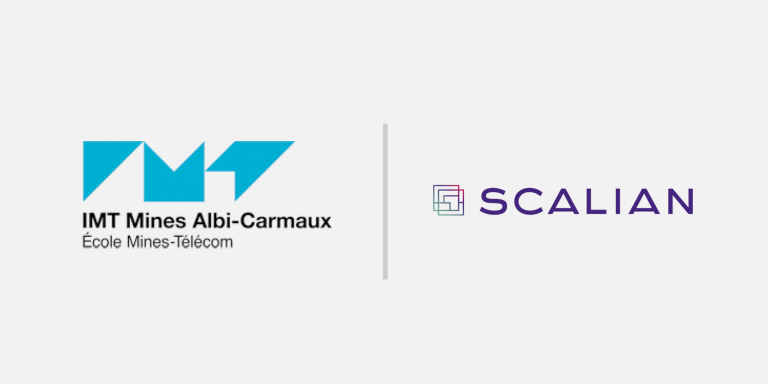
On September 2, 2019, Scalian, an international group specialized in consulting and engineering, and the engineering school IMT Mines Albi signed a 5-year renewable industrial partnership. The joint SCAN (Systems of Agile and Digital Collaboration) laboratory, dedicated to R&D in supply chain management, aims to provide decision-makers with the keys to better take into account the risks and opportunities to which their business is subject and thus improve the agility and resilience of their supply chains. Two years later, the two partners are drawing up an initial assessment of their work.
Founded in 1989, Scalian provides services in France and abroad in industrial project management, supply chain (costs, quality, deadlines, performance), architecture and development of embedded digital systems and applications for information systems, big data and AI. The group participates in major programs for the big names in aerospace, energy, transport and defense.
For its part, the Industrial Engineering Center (CGI) of IMT Mines Albi has developed an expertise in the application of AI-based methods to the world of industrial engineering. In particular, it has developed collaborations with renowned institutions such as Georgia Tech (USA), whose contribution is planned in the research program with Scalian. The CGI brings together a variety of scientific expertise in AI:
- Data science, the pivotal discipline,
- model engineering,
- knowledge-based engineering,
- operations research.
IMT Mines Albi now has 7 joint laboratories with numerous partners with the aim of broadening the fields of research and fostering technology transfer, including the SCAN laboratory.
The objective of the SCAN program is to develop immersive solutions based on technologies such as virtual reality, augmented reality, multi-player serious games, holistic simulation, interactive dashboards, cockpits and control towers… to provide decision-makers with a clear, dynamic, interactive and contextual vision of the interactions at work in their supply chains.
Immersive piloting based on AI
For the past two years, Scalian and ITM Albi have been working together on a tool-based methodology to manage the performance of systems by measuring threats and opportunities through the implementation of concrete application cases in various business sectors.
Julien Jeany, co-director of the joint SCAN laboratory and head of the R&D and Innovation laboratory for Scalian, explains:
“Innovation on this theme is twofold. On the one hand, threats and opportunities are considered as forces based on an approach known as “Physics of Decision” (POD). The latter proposes a parallel with the physical forces that govern our reality, the attributes and characteristics of the system whose performance we seek to measure according to different indicators. On the other hand, there is the control environment component, which we address by proposing an immersive approach based on virtual reality.
Concrete cases of application
SCAN researchers have created a cockpit for piloting an aeronautical supply chain in VR. The comparison between a performance trajectory without supply chain disruptions and an alternative trajectory in a 3-dimensional space allows to measure the impacts of threats that can become problems, but also to evaluate the opportunities around the system that could be activated to counterbalance these threats and return the performance trajectory of the system to an optimal state.
The perfectly functional cockpit prototypes developed in the SCAN joint laboratory are already attracting strong interest from industry.
A physical approach to decision-making to better support decision-makers
To support decision-making, we need to understand the impact of different events in order to be able to reconfigure and propose solutions based on the events that take place.
The SCAN laboratory was thus mandated by an industrial company unable to deliver for a recovery mission. Thanks to the approach conceived around the concept of “decision physics”, the laboratory, after having studied the functioning of the production line, carried out a precise evaluation on various indicators of the impacts, and identified the various cycles, and the various decisions to be taken.
The modelling of the functioning of the system under study must be sufficiently fine in order to be able to represent reality as well as possible through a simulation, and then be integrated into the control environment.
Julien Jeany states:
“Today, instability has become the norm with one crisis after another and a paradigm that is no longer that of a world where everything is reliable. By adopting this POD approach, we support decision-makers in their decision-making and help them understand the dynamics that manage their system but also what the system may be sensitive to in terms of disruptions.
A concept that can be generalized to many systems
The laboratory’s research work was initially focused on the management of threats and opportunities that can impact a system such as a supply chain. The researchers were then able to see that this concept could be generalized to any system whose performance can be measured through indicators.
Concrete cases of application were thus developed, such as the management of a crisis related to the reconfiguration of road networks in the context of floods that affected the city of Nantes, or more recently on the management of health crises such as those we have experienced with COVID-19.
A large-scale project was also developed with Georgia Tech in the United States during the last American presidential elections. The SCAN laboratory sought to model the polling station installed in the institution in order to optimize the passage times and the flow of voters within the polling station.
Translated from Supply Chain : l’IMT Mines Albi et Scalian dressent le bilan de leurs travaux de recherche au sein de leur laboratoire commun SCAN









